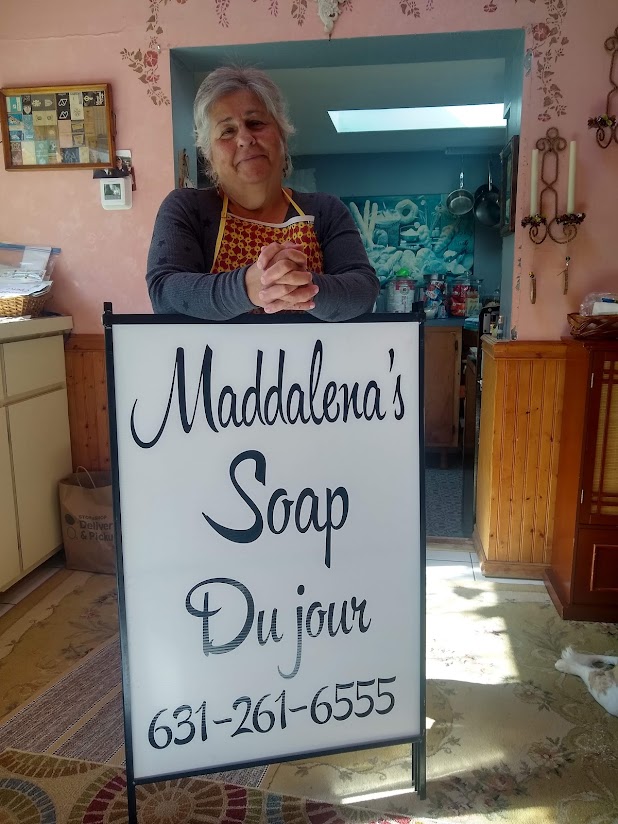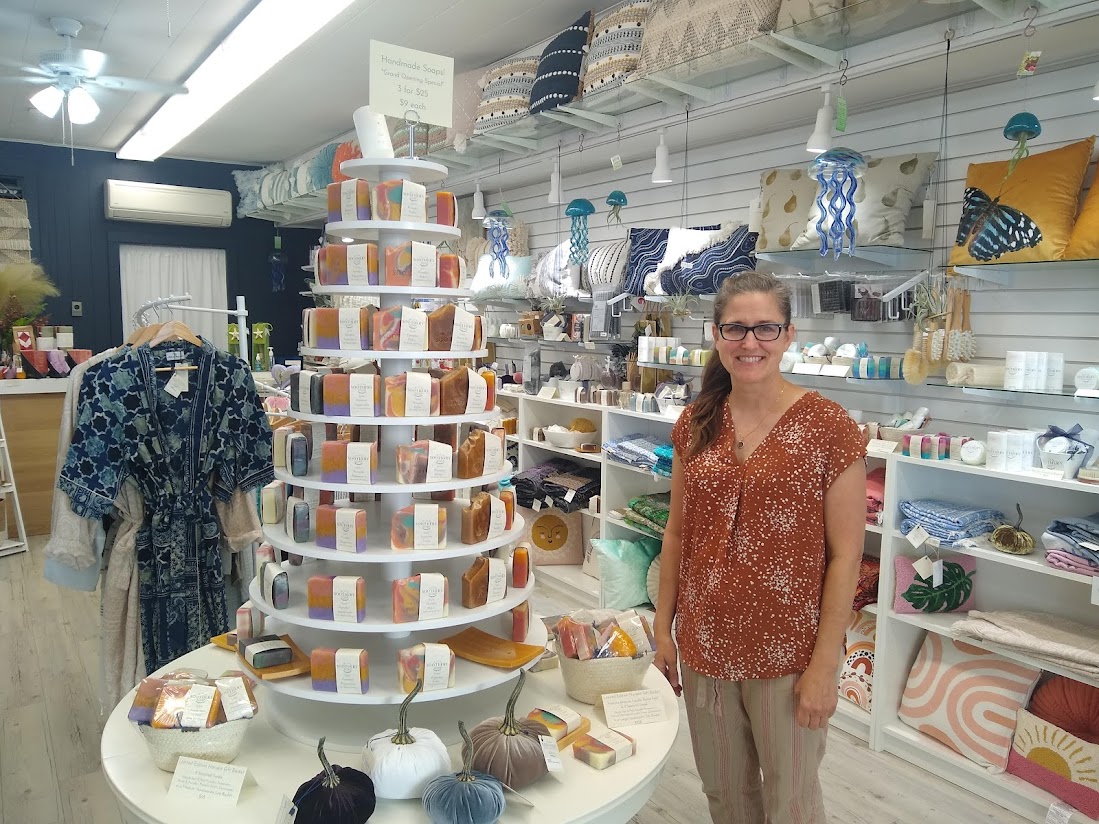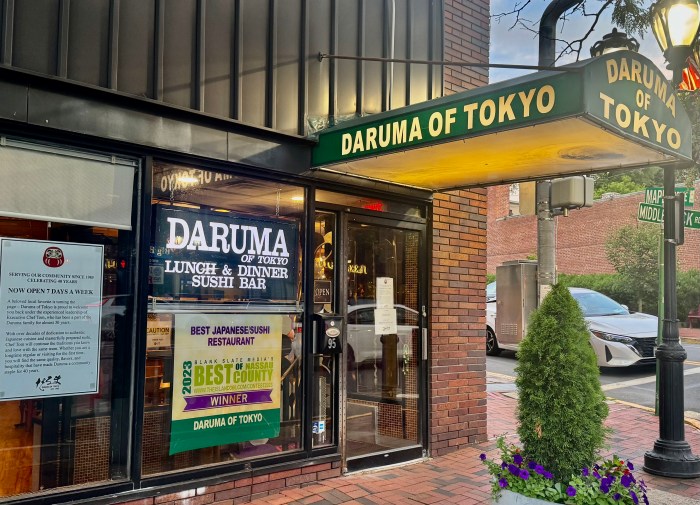By Bernadette Starzee
Dana Porciello began making artisan soap bars as a creative outlet. After several years of developing her soaps and other products, she opened a retail store in Northport Village called The Soothery in May 2021.
Porciello, who worked as a ceramic artist and was the ceramic artist in residence at Stony Brook University before having children, was going through some challenges in her life and thought developing a creative business would help her deal with those challenges.
She makes her soaps with high-quality ingredients such as coconut oil and olive oil, merging colors and scents to convey a feeling, and she gives them names like “Beach Day,” “Citrus Basil” and “Pumpkin Pickin’.” She began selling them at craft fairs about four years ago and eventually on her website, TheSoothery.com.
“The response of people to my products was so powerful,” she said. “I loved knowing how much my products made people happy.”
With an eye toward opening a retail store, Porciello expanded her product line by creating salt scrub bars, lotion bars, and lip balms, and attended trade fairs to source additional products from other artisans.
“If it’s something that is soothing and that would have comforted me when I was going through hard times, then I include it,” she said.
The Soothery’s items include cozy bathrobes, blankets, slippers, candles, and inspirational cards.
Since the store’s opening, Porciello said, sales and local support have been strong.
“I am living my dream,” she said.
Maddalena Harris also began hand-crafting soap as a way to deal with a difficult time.
“My husband was getting sick, and I was looking for a creative outlet,” said Harris, who has always been drawn to the arts. After visiting several craft fairs, the Northport resident discovered an affinity for the soap-making community.
“Soapers are so passionate about their art form, and they’re so generous,” she said. “I said, this is something I could do. My husband was on board, as he always was, and I began making soap.”

After her husband passed away, Harris continued to make decorative soap, with subtle aromas and high-quality ingredients like olive, coconut, and avocado oil and therapeutic-grade essential oils. She has made about 500 bars under the brand name Maddalena’s Soap du Jour, giving away many of them as she focused on perfecting the process. Now exploring ways to turn her hobby into a business, Harris was particularly successful selling soap at a fundraiser for a local arts group. She donated 40% of the proceeds to the organization, and she recently took a table at a local church fair.
“Doing craft fairs is a good method for validating your ideas and seeing how your product sells. You can get great feedback and earn money at the same time,” said Brian Fried, a Melville-based serial inventor, inventor coach, and founder of the National Inventor Club, an online group that he expanded nationally from the Long Island Inventors Club, which met at Farmingdale State College before the pandemic.
But as sales at craft fairs are limited by the number of attendees, Fried counsels entrepreneurs about the benefits of exploring online sales.
“You can reach the whole world online and use social media to drive traffic to your website or wherever your product is sold,” he said.
Through his company, Inventor Smart, Fried helps entrepreneurs turn their idea into reality, from securing patent or trademark protection and licensing deals to barcoding, packaging and marketing.
“If people have one product, it’s difficult – but not impossible – to get it into a physical retail store,” Fried said. “Buyers prefer companies with product lines with multiple items, but they’re more willing to work with one product for online sales. Online retailers like QVC.com, Walmart.com, and Lowes.com are always looking for new products – that’s what keeps consumers coming back to them. They look to entrepreneurs and innovators to come out with new products to offer to their customers, and they have really opened the door for inventors to sell online.”
National Inventor Club member Tony Pagoto is a retired information technology professional from Cutchogue whose career highlights included working on the Apollo 11 moon landing as a Grumman employee. The passionate inventor’s latest product is the Twist Lock Grommet, a device for organizing the wires behind a computer or TV. Pagoto, whose company is named JBL Products for the initials of his three daughters’ names, has a patent for the device, which can be installed without tools and locks into place.
“When you are sitting in your living room having a glass of wine with your spouse, you don’t want to look at wires running up and down the walls,” he said.
Pagoto worked on perfecting the product in his garage for several years, making hundreds of prototypes, first with cardboard, then PVC pipe and metal. He had 3D printed professional prototypes created before making the steel physical mold that would be used in the manufacturing process. “The steel mold cost about $35,000, so before going to that expense, I had to make sure it was perfect,” he said.
Pagoto chose to market his product through Amazon about two years ago.
“People use Amazon a lot, so I thought, ‘Let’s put it there and see what happens,’” he said.
What happened was that sales have exceeded Pagoto’s wildest dreams, helped by dozens of 5-star customer reviews. The product was also added to Walmart.com, and Pagoto is now focused on scaling the business.
Like Pagoto, East End resident Amanda Fennell filed for a patent for her invention, the ColorShield Art Kit. Fennell has a master’s degree in art therapy and taught art before staying home to raise her children.
Fennell, whose company is called The Art Nanny, likened the ColorShield concept to fastening blue tape along the borders before painting a wall so the paint stays within the boundary. The art kit comes with ColorShield shapes such as a polar bear, butterfly, or lighthouse, which can be affixed to the paper and then peeled off after the child colors or paints a background. The artist can then add details to the distinct shape to create art featuring a recognizable focal item.
From her time as a teacher, Fennell knew that oftentimes, the paintings and drawings that kids create in school wind up in a pile.
“I wanted to offer one project from start to finish, so my product came with all the materials and a glass frame,” she said. “Kids build the ColorShield in the frame, and then take it home, where it can be hung on a wall.”
The ColorShield was a hit at local fairs and the public library in Southampton, where Fennell began giving ColorShield classes. Soon word spread and other libraries started calling.
But then the pandemic struck and, like other entrepreneurs, Fennell had to adjust. She created art kits for the libraries to give kids to take home. The glass frames wouldn’t work, so she incorporated a black mat background instead. Libraries in Suffolk and now Nassau County have been ordering the kits, which include a QR code for logging on to her website for a tutorial.
“It’s like I got on a train and it took off,” Fennell said of her business. “And it’s not stopping.”
For more business coverage visit longislandpress.com/category/business
Sign up for Long Island Press’ email newsletters here. Sign up for home delivery of Long Island Press here. Sign up for discounts by becoming a Long Island Press community partner here.
































